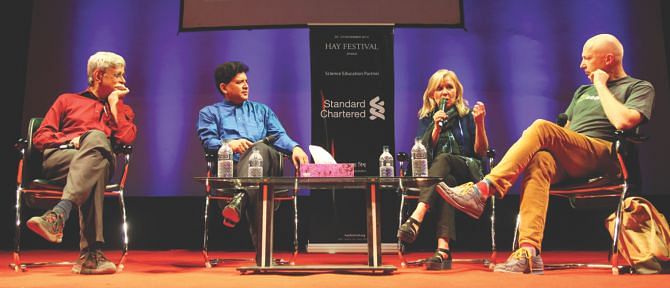Lab coats and ink blots

Science and its perception to its audience is not exactly a discussion you would expect to be a highlight of a literary festival like Hay. Not only was it a part of the festival, it also drew an unexpectedly large crowd.
The “Science Matters” session was moderated by Hossain Zillur Rahman with panelists Muhammad Zafar Iqbal, Lucy Hawking and Marcus du Sautoy, authors who engage with science in their writing in different capacities.
The discussion commenced with Lucy Hawking, author of George, talking about her work of making science accessible to children. Lucy, the daughter of prominent theoretical physicist, Stephen Hawking, reflected on how she was inspired by her father to walk down the path she is currently on; when her son's friends seemed enamoured by Hawking at a birthday party, it struck her how enthusiastic children were about certain aspects of science. “When one of my son's friends asked my father what would happen to him if he fell down a black hole, he replied in an electronically assisted voice: 'You would turn into spaghetti!' That's how George started, from a bowl of spaghetti came a book series.”
Professor of mathematics at Oxford Unviersity, Marcus du Sautoy, like Lucy, knows a thing or two about making science accessible and entertaining. Writing a science column for a newspaper might not be the height of scientific thought, but it serves a bigger purpose, he opined, in engaging a future generation of scientists. Lucy interjected, talking about the importance of a rethinking of the image of the “scientist” in popular culture, and moving away from the bespectacled nutty professor conducting evil experiments up in his tower to something children find more appealing.
What do children find appealing? Exotic astrophysics, the possibility of aliens, and black-holes. Lucy has strict parameters to work with, however, as she cannot write about fringe science just yet.
Muhammad Zafar Iqbal, science-fiction writer extraordinaire and Bengali academic, talked about the ongoing efforts in encouraging young people to go into pure sciences as opposed to following the parental pressure of studying engineering or medical sciences.
While moderator Hossain Zillur Rahman said he was out of place in the panel because he was not a man of science, as the talk progressed, the policy analyst and educator in him found links relevant to the Bangladeshi perspective.
As the floor was opened up to the audience, one member of the audience asked whether it was the government's responsibility or that of the university authorities to divert students from menial jobs and getting them interested in science. Marcus said that the brunt of the work need not be on the government, as strong social activism can get the job done. Zafar Iqbal disagreed, saying the government had its role to play in a country of 160 million people.
Overall, the session was a lively discussion on a crucial matter, and the reactions from the panelists as well as from the audience proved that there definitely needs to be more of the same in the coming Hay Festivals.

 For all latest news, follow The Daily Star's Google News channel.
For all latest news, follow The Daily Star's Google News channel. 



Comments